In his engagingly casual 1997 autobiography, Are You Anybody?, the actor Bradford Dillman, who has died aged 87, took a self-deprecatory view of his own career in particular and of acting in general – a profession he considered just below that of used-car salesman in the American social order. About his prolific work in cinema and television, he was sanguine, having settled for what he called “the Safeway solution” – a willingness to accept any role in order to put food on the family table.
On stage Dillman had achieved early success as Edmund in the 1956 Broadway production of Eugene O’Neill’s Long Day’s Journey into Night. This lauded production starred Fredric March as the father and Jason Robards as the alcoholic brother Jamie. Although Robards received greater acclaim in the juicier role, Dillman received good notices and the play kickstarted his career. When the play was filmed in 1962, however, Dean Stockwell took over the role of the younger brother. This circumstance was dictated by Dillman’s contract with 20th Century Fox, which led to his debut as the romantic lead in the glossy A Certain Smile (1958), quickly followed by In Love and War.
By far the most notable of his Fox movies was Richard Fleischer’s Compulsion (1959), in which he and Stockwell were chillingly cast as the murderous Leopold and Loeb. Their barnstorming co-star Orson Welles (as the defence lawyer) never forgave the youngsters when the trio shared the best actor award at the 1959 Cannes film festival. Dillman’s cool performance as the dominant, intellectual psychopath also won him a Golden Globe as the year’s most promising newcomer.
The following year he was cast opposite Welles in Fleischer’s Crack in the Mirror and his career seemed set fair. He was a handsome, contracted actor with a suave manner, elegantly suited to playing villains. Between his 1958 debut and 1973, when he played his favourite screen role of Willie Oban in John Frankenheimer’s successful treatment of O’Neill’s The Iceman Cometh, Dillman notched up some 30 movies and a comparable number of TV series. But having come full circle with the O’Neill, his work became increasingly mundane.

He still remained happy, since acting had been an ambition since his schooldays. He was born in San Francisco, California, the son of Dean Dillman, a stockbroker, and his wife, Josephine (nee Moore). Bradford took part in amateur theatrics at school and studied English literature at Yale University. After service in the Marine Corps, he set himself a five-year time limit to achieve credibility as an actor. Within a year, he had progressed from menial jobs and a crowd scene in a production of Inherit the Wind, to a New York debut in Scarecrow and three summer seasons at the Playhouse in Connecticut. Theatre took a back seat following a lead role in The Fun Couple (1957), which lasted for only two performances in New York.
Cinema took over and three busy years later he found himself in London for Circle of Deception, playing a spy tortured into betrayal by the Gestapo. His co-star was the fashion model turned actor, Suzy Parker. Within months she and Dillman were married and she later abandoned acting for family life. She had one child by a former marriage and Dillman had two. They also had three children together and Dillman referred to them as his “six Oscars”.
His career was not helped by the turgid film Sanctuary (1961), but took a boost with his role as the saint in a lavish account of Francis of Assisi (also 1961) and innumerable television appearances in series such as Cannon and Mission Impossible.
He was nothing if not versatile. He was a cavalry officer in a rehash of The Plainsman (1966), a lawyer in the excellent Sergeant Ryker (1968) and an amnesiac in Jigsaw (also 1968). He fared better as a major in the briskly exciting The Bridge at Remagen (1969) and was a lowlier captain in the satire Suppose They Gave a War and Nobody Came? (1970).
Despite roles as a doctor in Escape from the Planet of the Apes (1971) and a senator in another science fiction movie, The Resurrection of Zachary Wheeler (1971), he was most often cast as the villain and estimated that he had “wasted” more than 1,000 people during his lengthy career. There was, however, light relief in being cast (in his early 40s) as JJ, an undergraduate in the romantic drama The Way We Were (1973). In the same year, he joined a fine cast in The Iceman Cometh, but for the rest of the decade he was relentless in the pursuit of work. He acted in more than 20 movies in the next seven years – few of note.

Bug (1975) gave him the lead role as a scientist and another horror flick, Piranha (1978), enjoyed even greater cult status. He was Clint Eastwood’s Captain in one of the weaker Dirty Harry movies, The Enforcer (1976). But all too often the movies were dire – none more so than The Swarm (1978), a starrily cast disaster movie about killer bees.
He moved towards television, hopeful of long-running series. The glossy Falcon Crest (1982-83) lasted longer than King’s Crossing (1982), a rather earnest drama about the problems of a family in rural California. He also became a fixture in his friend Angela Lansbury’s successful Murder, She Wrote, appearing in many episodes from 1985 onwards.
His films thereafter included a violent adventure Treasure of the Amazon (1985), a cheap Roger Corman production Lords of the Deep and a Rambo rip-off Heroes Stand Alone (both 1989). There was modest consolation in The Legend of Walks Far Woman (1982), in which he co-starred with Raquel Welch, and in being Eastwood’s boss in Sudden Impact (1983). But after The Heart of Justice (1992), a thriller about a sinister family, he virtually retired from the screen.
In 1994 Dillman wrote Inside the New York Giants and indulged himself in his obsession with American football, including tireless work with the San Francisco 49ers. He embarked, too, on writing his “war stories” - recording a lifetime “most people can only dream about”.
Suzy died in 2003. He is survived by his children, Jeffrey, Pamela, Charlie, Christopher and Dinah, and stepdaughter, Georgia.

Comments (…)
Sign in or create your Guardian account to join the discussion